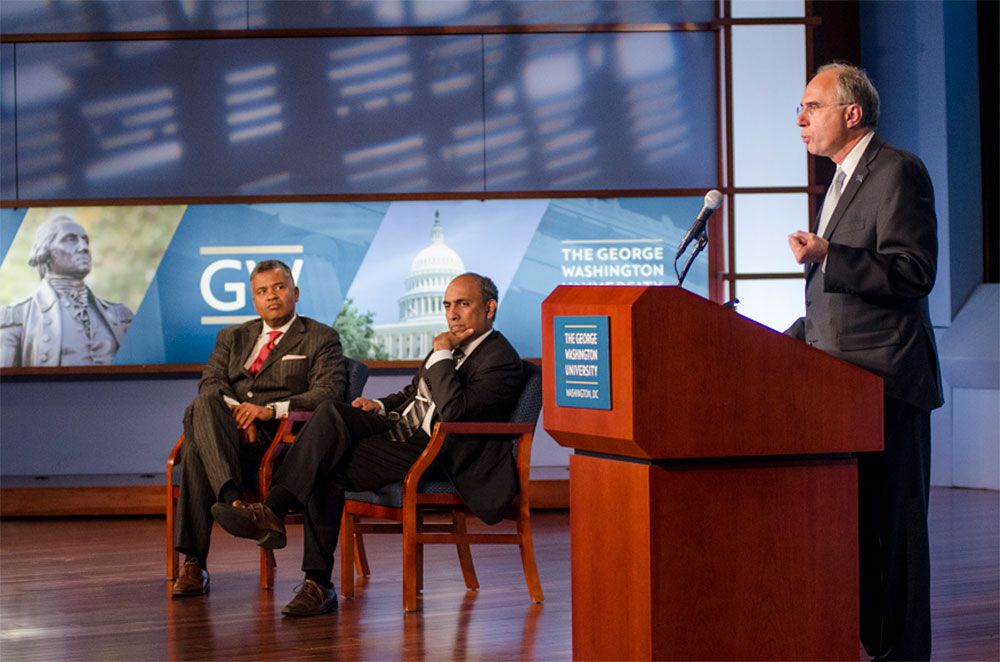
The numbers are staggering, said the GW School of Medicine and Health Sciences (SMHS) professors headlining “Frontiers in Medicine: Innovations in Kidney Research and Transplants”: 26 million people in the United States have chronic kidney disease (CKD); only 387,512 of those people have received kidney transplants; 3,000 patients are added to the waiting list every year; and 4,453 die while on the list.
“Kidney disease is an epidemic,” said Muralidharan Jagadeesan, M.B.B.S., associate professor of medicine at SMHS, at the April 29 event. The “Frontiers in Medicine” series, which began in 2011, is designed to connect members of the Washington, D.C. community with renowned health care experts.
Washington, D.C. in particular, said Jagadeesan and Anton Sidawy, M.D., M.P.H. ’99, Lewis B. Saltz Chair and professor of surgery at SMHS, has the highest prevalence of CKD in the nation. The city also has the highest mortality rate in the country and the youngest group on dialysis.
“There is really a huge need in Washington, D.C. area for kidney transplantation,” Sidawy said. “Approximately 2,000 people are listed for kidney transplantation here. Currently, there are only about 300 of these procedures.”
As Jagadeesan explained, the incidences of CKD are concentrated in the District because minority populations tend to be most at risk for hypertension and diabetes, which can lead to kidney disease. There’s also a lack of access to affordable health care.
“I could go on and on,” Jagadeesan said. “But our problem is to fix it; to make sure that you get a transplant.”
Kidney transplants, explained both Jagadeesan and Joseph Melancon, M.D., professor of surgery and chief, Division of Transplant Surgery at SMHS, are a better option compared to dialysis; not only is a transplant more cost-effective, but it also allows patients to lead more active lives.
“If you look at the cost of dialysis versus the cost of transplant, transplant is a lot cheaper,” Melancon said. “It’s about $80,000 to $100,000 per year to keep someone on dialysis; it costs about $30,000 per year to keep someone well with a transplant. There are a lot of societal benefits. People go back to work; they’re better members of society.”
With the benefits of transplantation in mind, doctors have expanded the criteria for transplants to include high-risk patients.
“The oldest patient I transplanted was 82 years old, and it was a deceased-donor transplant, not even a live donor,” Jagadeesan said. “He lived for the next eight years very happily, took family vacations, spent time out in the world, and had a great life. We also offer it to patients with HIV and Hepatitis C. We push the envelope so more and more patients can get a transplant.”
As with any commodity, however, demand can outweigh supply.
“The number of kidney transplants is going up, but it’s not going up enough to meet the need,” Melancon said.
The medical community is now making a push for more donors. For those who want to donate to a family member but are not a match, they can give to someone else, creating a daisy-chain effect of donations and transplants.
“It’s another way of dealing with this huge problem of kidney disease,” said Melancon, who has broken the world record for kidney swaps four times and recently completed 16 kidney transplants in the Washington, D.C. area.
In the meantime, there have been advancements in immunosuppression and surgical techniques, and medical personnel are joining forces to increase access to transplants.
“The whole thing is a team effort, which we provide,” Jagadeesan said. “It’s not just one person. It’s not just a surgeon, it’s not just me; it’s the coordinator, the social worker, the pharmacist, the dietician. It’s everybody on the GW transplant team who’s going to work together to provide the service for you so that you can participate in this very successful voyage of kidney transplant with us.”


